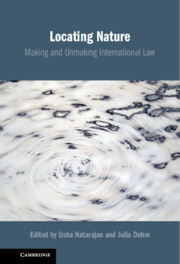

Most ebook files are in PDF format, so you can easily read them using various software such as Foxit Reader or directly on the Google Chrome browser.
Some ebook files are released by publishers in other formats such as .awz, .mobi, .epub, .fb2, etc. You may need to install specific software to read these formats on mobile/PC, such as Calibre.
Please read the tutorial at this link: https://ebookbell.com/faq
We offer FREE conversion to the popular formats you request; however, this may take some time. Therefore, right after payment, please email us, and we will try to provide the service as quickly as possible.
For some exceptional file formats or broken links (if any), please refrain from opening any disputes. Instead, email us first, and we will try to assist within a maximum of 6 hours.
EbookBell Team

0.0
0 reviewsFor those troubled by environmental harm on a global scale and its deeply unequal effects, this book explains how international law structures ecological degradation and environmental injustice while claiming to protect the environment. It identifies how central legal concepts such as sovereignty, jurisdiction, territory, development, environment, labour and human rights make inaccurate and unsustainable assumptions about the natural world and systemically reproduce environmental degradation and injustice. To avert socioecological crises, we must not only unpack but radically rework our understandings of nature and its relationship with law. We propose more sustainable and equitable ways to remake law’s relationship with nature by drawing on diverse disciplines and sociocultural traditions that have been marginalised within international law. Influenced by Third World Approaches to International Law (TWAIL), postcolonialism and decoloniality, and inspired by Indigenous knowledges, cosmology, mythology and storytelling, this book lays the groundwork for an epistemological shift in the way humans conceptualise the relationship between law and nature.
usha natarajan is Edward W. Said fellow at Columbia University. A leader in the TWAIL movement, she is a founding editor of the TWAIL Review. Her research on environmental justice in the Global South received the International Union for Conservation of Nature Environmental Law Award. With over 40 publications, she has led global research grants from the EU and Canada and worked with the United Nations.
julia dehm is senior lecturer at La Trobe University Law School. Her research addresses international and domestic climate and environmental law, natural resources, human rights, economic inequality and social justice. She is the author of Reconsidering REDD+: Authority, Power and Law in the Green Economy (Cambridge, 2021).